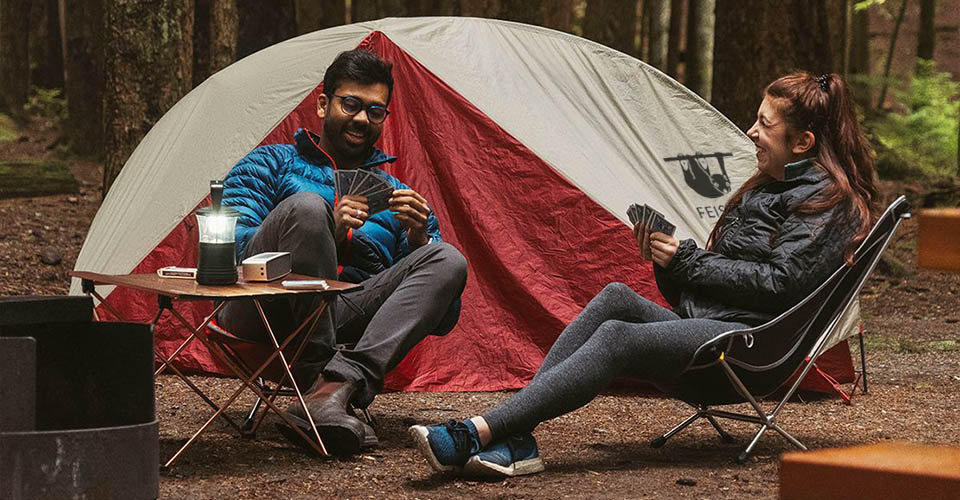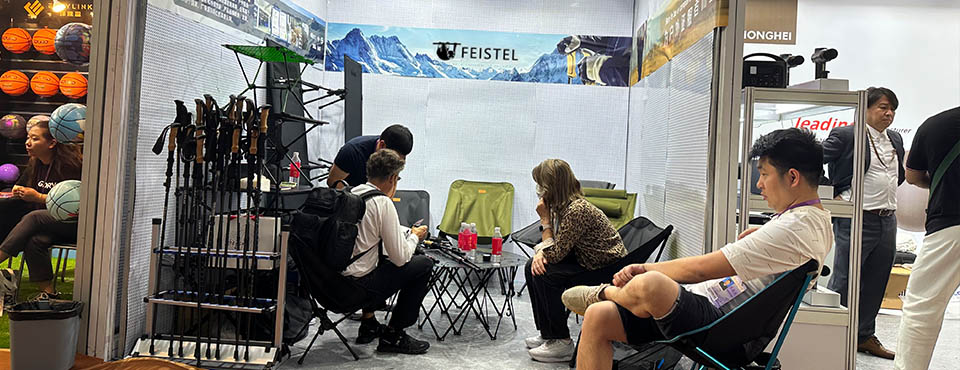필수 캠핑용품 알아보기
적절한 공급업체를 식별하기 전에 귀하의 비즈니스에 필수적인 제품에 대한 명확한 이해가 필요합니다. 필수 캠핑 장비에는 텐트, 침낭, 배낭, 조리 장비 및 모든 캠핑객에게 필요한 기타 기본 품목이 포함됩니다. 이는 제품 범위의 필수 요소이며 높은 내구성, 기능성 및 안전성 기준을 충족해야 합니다. 어떤 제품이 필수인지 알면 고품질 캠핑 장비를 전문으로 하는 업체에 공급업체 검색에 집중할 수 있습니다. Anhui Feistel Outdoor Products Co., Ltd.는 캠핑 의자, 캠핑 테이블, 캠핑 카트, 야외 방수포, 캠핑을 제공합니다. 텐트, 우리는 또한 고품질 아웃도어 제품의 포괄적인 DEM&ODM을 제공합니다.
브랜드 차별화를 위한 틈새 제품
필수 요소 외에도 브랜드를 경쟁사와 차별화할 수 있는 틈새 제품을 제공하는 것도 고려해 보세요. 틈새 품목에는 배낭 여행자를 위한 초경량 장비, 친환경 캠핑 용품 또는 야외 활동을 즐기는 사람들을 위한 혁신적인 기술 장치가 포함될 수 있습니다. 고유한 제품을 식별하고 소싱함으로써 캠핑 시장의 특정 부문에 서비스를 제공하고 헌신적인 고객 기반을 확보하며 브랜드를 혁신과 지속 가능성 분야의 리더로 자리매김할 수 있습니다.
잠재 공급업체 조사
인터넷은 도매 공급업체를 찾는 데 유용한 자원의 보고입니다. Alibaba, Global Sources 및 ThomasNet과 같은 온라인 디렉토리는 훌륭한 출발점입니다. FEISTEL은 Alibaba.com과 Made-in-China.com에 매장을 두고 있습니다. 이러한 플랫폼을 사용하면 제품 카테고리, 위치 및 비즈니스 유형별로 공급업체를 검색할 수 있습니다. 그러나 진정한 가치는 잘 알려지지 않았지만 뛰어난 제품과 서비스를 제공하는 숨겨진 보석, 즉 공급업체를 찾는 데 있습니다. 여러 디렉토리에 대한 철저한 조사 및 비교를 통해 귀하의 비즈니스 요구 사항에 완벽하게 맞는 공급업체를 찾을 수 있습니다.
산업전시회 및 박람회 활용
무역박람회와 박람회는 공급업체와의 연결에 매우 중요합니다. 이러한 이벤트는 업계 전문가들을 한 자리에 모아 제품을 직접 보고, 공급업체 담당자를 만나고, 거래를 협상할 수 있는 독특한 기회를 제공합니다. Outdoor Retailer Show 또는 ISPO 뮌헨과 같은 업계별 이벤트에 참여하면 트렌드를 앞서가고, 새로운 제품 라인을 탐색하며, 잠재적 공급업체와의 관계를 구축할 수 있습니다. 이러한 이벤트에서 대면 상호 작용을 통해 공급업체의 신뢰성과 비즈니스 정신을 더 잘 이해할 수도 있습니다.
업계 관계자와의 추천을 위한 네트워킹
네트워킹은 신뢰할 수 있는 공급업체를 찾는 가장 효과적인 방법 중 하나입니다. 동료 사업주, 무역 협회 회원, 심지어 경쟁업체와 같은 업계 내부자들도 귀중한 추천을 제공할 수 있습니다. 이러한 권장 사항은 개인적인 경험을 바탕으로 한 경우가 많으며 잠재적 공급업체를 조사하는 데 드는 시간을 절약할 수 있습니다. 캠핑 및 아웃도어 산업 내에서 연락 네트워크를 구축하면 신뢰할 수 있는 공급업체를 찾는 데 도움이 될 뿐만 아니라 업계 발전 및 새로운 동향에 대한 정보를 계속 얻을 수 있습니다.
공급업체 신뢰성 평가
공급업체 신뢰성 평가를 위한 주요 지표
잠재적 공급업체를 평가할 때 주요 지표를 사용하여 신뢰성을 평가하는 것이 중요합니다. 여기에는 배송 시간, 제품 품질, 커뮤니케이션 효율성, 재무 안정성이 포함됩니다. 신뢰할 수 있는 공급업체는 납품 기한을 지속적으로 준수하고, 높은 제품 표준을 유지하며, 프로세스 전반에 걸쳐 효과적으로 커뮤니케이션합니다. 또한 탄탄한 재무 배경을 갖추고 있어 대규모 주문을 처리하고 장기적인 파트너십을 유지할 수 있습니다. 이러한 지표를 분석하면 신뢰할 수 없는 공급업체를 방지하고 공급망을 견고하게 유지하는 데 도움이 됩니다.
가격구조의 이해
도매가격 해독: 무엇이 공정한가?
도매 가격은 복잡할 수 있으므로 공정한 가격이 무엇인지 이해하는 것이 중요합니다. 공정한 도매 가격을 통해 시장에서 경쟁력을 유지하면서 건전한 이윤을 유지할 수 있습니다. 여러 공급업체의 가격을 비교하고 제품 품질, 배송비, 최소 주문 수량 등의 요소를 고려하는 것이 중요합니다. 가장 저렴한 옵션이 항상 최고는 아니라는 점을 명심하세요. 때로는 우수한 품질과 서비스를 위해 약간 더 높은 가격을 지불하는 것이 투자 가치가 있다는 점을 명심하세요.
더 나은 거래를 위한 협상 전술
협상은 예술이며 공급업체로부터 최상의 거래를 확보하려면 기술과 전략이 필요합니다. 강력한 관계가 더 나은 조건으로 이어지는 경우가 많으므로 공급업체와 관계를 구축하는 것부터 시작하십시오. 예산과 수량 요구 사항을 명확히 하고 이 정보를 사용하여 할인이나 더 나은 지불 조건을 협상하세요. 조건이 좋지 않으면 떠나는 것을 두려워하지 마십시오. 보다 유리한 조건으로 사업을 수행하려는 다른 공급업체가 항상 있습니다. 성공적인 협상은 양측 모두에게 이익이 되는 윈윈(win-win) 솔루션을 찾는 것임을 기억하십시오.
대량주문이 가격에 미치는 영향
대량 주문은 비용을 절감하고 이윤을 높이는 가장 효과적인 방법 중 하나입니다. 많은 공급업체는 생산 및 배송 프로세스를 최적화할 수 있도록 대량 주문에 대해 상당한 할인을 제공합니다. 그러나 대량 주문에는 과잉 재고 및 현금 흐름 제약과 같은 위험도 따릅니다. 대량 주문을 하기 전에 필요한 재고와 시장 수요를 주의 깊게 계산하는 것이 중요합니다. 대량 구매와 신중한 재고 관리의 균형을 유지함으로써 리소스를 과도하게 확장하지 않고도 대량 가격 책정의 이점을 극대화할 수 있습니다.
제품 품질 평가
샘플 주문의 중요성: 확정 전 테스트
제품 샘플은 공급업체 선택 과정에서 중요한 부분입니다. 대량 주문을 하기 전에 샘플을 요청하여 품질을 직접 평가해 보세요. 이를 통해 제품의 소재, 장인정신, 전반적인 내구성을 평가할 수 있습니다. 실제 조건에서 샘플을 테스트하면 언뜻 보기에는 명확하지 않을 수 있는 잠재적인 문제를 밝힐 수 있습니다. 샘플을 기꺼이 제공하려는 공급업체는 제품에 대한 자신감과 품질에 대한 헌신을 보여주며, 이는 신뢰할 수 있는 파트너의 긍정적인 지표입니다.
인증 및 규정 준수: 표준 충족 보장
캠핑 산업에서 특정 제품은 특정 안전 및 품질 기준을 충족해야 합니다. 공급업체가 필요한 인증을 보유하고 업계 규정을 준수하는지 확인하세요. 이러한 인증에는 ISO 표준, 환경 인증 또는 안전 승인이 포함될 수 있습니다. 규정 준수는 귀하의 비즈니스를 법적 책임으로부터 보호할 뿐만 아니라 고객에게 귀하의 제품이 안전하고 품질이 우수하다는 점을 보장합니다. 관련 규제 기관이나 제3자 감사 기관을 통해 이러한 인증의 진위 여부를 확인하세요.
품질 저하로 인한 장기적 비용
제품 품질을 저하시키면 단기적으로는 비용을 절약할 수 있지만 장기적으로는 비참한 결과를 초래할 수 있습니다. 품질이 낮은 제품은 반품률이 높아지고 고객 불만이 증가하며 브랜드 평판이 손상됩니다. 시간이 지남에 따라 이러한 문제와 관련된 비용은 초기 절감액보다 훨씬 클 수 있습니다. 처음부터 품질을 우선시하고 우수성에 대한 약속을 공유하는 공급업체를 선택하는 것이 중요합니다. 이를 통해 고객에게 사랑받는 브랜드를 구축하게 됩니다 신뢰와 복귀로 장기적인 성공을 보장합니다.
해운 및 물류
적시 배송의 중요성
원활한 공급망을 유지하고 고객 기대에 부응하려면 시기적절한 배송이 중요합니다. 지연으로 인해 운영이 중단되고 품절이 발생하며 평판이 손상될 수 있습니다. 공급업체를 선택할 때 납품 실적을 평가하고 귀하의 일정을 충족할 수 있는 능력이 있는지 확인하십시오. 신뢰할 수 있는 공급업체는 명확한 배송 일정을 제공하고 잠재적인 지연에 대해 투명하게 알려야 합니다. 정시 납품 이력이 있는 공급업체를 우선순위로 지정함으로써 공급망 중단 위험을 최소화하고 비즈니스를 원활하게 운영할 수 있습니다.
배송비 및 리드타임 이해
배송 비용과 리드 타임은 수익에 큰 영향을 미칠 수 있습니다. 정확한 예산 책정 및 계획을 위해서는 이러한 요소를 이해하는 것이 필수적입니다. 배송비는 주문품의 크기와 무게, 배송 방법, 목적지 등의 요인에 따라 달라집니다. 마찬가지로 리드타임은 공급업체의 위치와 생산 일정에 따라 달라질 수 있습니다. 공급업체와 이러한 세부 사항을 명확히 하고 이를 가격 전략에 반영하는 것이 중요합니다. 이렇게 하면 예상치 못한 비용이 발생하는 것을 방지하고 제품이 고객에게 신속하게 도달할 수 있습니다.
공급망 위험 관리: 비상 계획
공급망 위험은 비즈니스 수행에 있어서 피할 수 없는 부분이지만 효과적인 비상 계획은 그 영향을 완화할 수 있습니다. 공급업체 부실, 자연재해, 지정학적 문제 등 잠재적인 위험을 식별하고 이에 대한 해결 계획을 수립합니다.


